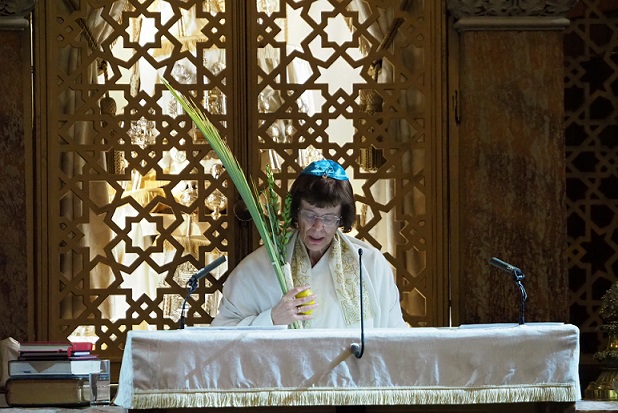British Muslims, Christians, and those of other faiths and none joined an open day at the West London Synagogue in London to celebrate a Shabbat Morning Service as part of Sukkot, which means a Festival of Tabernacles.
Sukkots are temporary structures that the Jewish people lived in during the 40 years they travelled after they escaped Pharaoh’s persecution in Egypt.
Since then, Sukkot has become an agricultural festival, similar to the philosophy of the American tradition of Thanksgiving, where people show gratitude to God for the blessings from the harvest of fruit and vegetables.

The Service
As the Rabbis spoke during the service, a number of themes were covered, my favorite was from Rabbi Helen when she described the nature of the festival.
“When you have eaten and become satisfied, we give thanks to God for the good land (blessed with harvest) that God has given,” she said.
This common theme of gratitude exists in all faiths, and from the Qur’an we read, “If you are grateful (to God) then I will surely increase the blessings already given to you.” (14:7)
Adding to this, Rabi Julia spoke of the feelings one should have at the festival when expressing gratitude. After reciting a verse in Hebrew she said, “..And then it says, exceptionally happy. Sukkot is supposed to be a very happy festival but the words (in Hebrew) are really emphatic, and from the Torah it’s really over the top. So everybody, the instruction from the Torah is to be very happy during Sukkot.”
Rabbi Julia continued reading in Hebrew then said, “Don’t turn up empty handed. You should bring real offerings. Every person should bring according to the gift of their hands (according to their means). In other words, if you have done really well this year you should bring a good offering. And it is all got to do with the place God gave you, the produce God gave you, all of the blessings that God has given you.”
The two themes which stood out for me were therefore gratitude for what a person has been blessed with, and sharing the blessings a person has, according to what is fair and within their means. These two philosophies alone are important at a time when so many in our nation struggle and need food banks, just to help make ends meet.

A Muslim Perspective
Speaking after the event, British Muslim activist and interfaith supporter Elizabeth Arif-Fear, who is also co-chair of the Nisa-Nashim group in Marylbone (an initiative which brings Muslim and Jewish women together) shared her insights:
“Today I’ve just attended the open house Shabbat during the Jewish festival of Sukkot. It was a really lovely service with a strong theme of welcoming refugees. Also the work they are continuing to do today. This includes welcoming a Syrian family here in London, sponsoring them to come over.
“We’ve just finished the lovely service with some beautiful music, hymns and prayers, including an interfaith prayer, and now we’re enjoying the Kiddish, which is a lovely food and drink reception.
“Afterwards we will be going upstairs to the library to learn more about one of the child refugees rescued during the Nazi occupation of (parts of) Europe during their occupation. This will be really enlightening, and quite an emotional time I think.
“West London Synagogue has always been really inclusive, really welcoming. Obviously as a Muslim, there are strong similarities (in our faiths) which really comes across in the service itself: where we can join in prayers, talking about God being One.
“But also the inclusion of interfaith prayers is a reminder of how welcoming they are at this Synagogue. And that is something I have found very reflective of the Jewish community as a whole in the UK.”